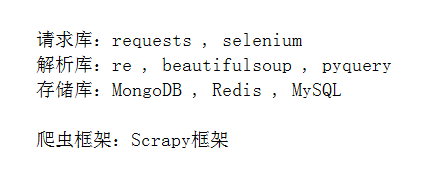requests请求库
目录

爬虫:爬取、解析、存储
一、请求
1、基本有用的参数
# 1.请求的url
https://www.cnblogs.com/linagcheng/
# 2.请求的方法
post,get,header...
# 3.请求头需要携带参数
Cookie
User-Agent # 说明自己是浏览器
Refer # 从哪个网站跳过来
# 4.请求体(formdata)——post请求才有
密码可能加密,可以使用错误的用户名+正确的密码,获取加密过的密码
2、请求url编码
# 1.url编码 --- 参数为中文,实际url使用的是原参数编码过的数据
# 例如:https://www.baidu.com/s?wd=汽车
# 实际上是:https://www.baidu.com/s?wd=%E6%B1%BD%E8%BD%A6
from urllib.parse import urlencode
keyword = input(">>>:")
res = urlencode({'wd':keyword})
print(res) # wd=%E6%B1%BD%E8%BD%A6
url = 'https://www.baidu.com/s?'+res
print(url)
3、headers参数——添加请求头中的数据
import requests
response = requests.get(url='https://www.baidu.com/s?wd=%E6%B1%BD%E8%BD%A6',
headers={
'User-Agent':Mozilla/5.0 (Windows NT 6.1; Win64; x64) AppleWebKit/537.36 (KHTML, like Gecko) Chrome/72.0.3626.119 Safari/537.36
},
)
4、params参数——不用urlencode
keyword = input('>>>:').strip()
response = requests.get(url='https://www.baidu.com/s?',
params={
'wd':keyword, # url中的参数,不用将中文进行编码
'pn':2, # 页码
},
headers={
'User-Agent':Mozilla/5.0 (Windows NT 6.1; Win64; x64) AppleWebKit/537.36 (KHTML, like Gecko) Chrome/72.0.3626.119 Safari/537.36
},
)
5、requests的其他参数
cookies # cookie 既可以写在requests的cookie中,也可以写在header中的Cookie中
allow_redirects:True/False # requests遇到location也会自动跳转,allow_redirects可以修改是否跳转
6、get方法与post方法
requests.get(url='....', headers={...}, cookie={...}, params={...})
requests.post(url='......', headers={...}, cookie={...}, data={...})
7、请求的整体流程
1.GET方式请求
可能会返回一个token,用于第二次请求携带
2.POST请求
二、响应
1、基本数据
# 响应状态码
200 成功
300 重定向
# 响应头
Location
Cookie
# 响应体
html # 正则筛选数据
json # 可以反序列化得到内容
二进制 # 以rb方式打开文件,写入文件
2、响应的参数
response.status_code # 响应状态码
response.text # 文本,获取页面HTML字符串
response.content # 二进制数据,可以写入文件
response.history # 获取页面跳转前的内容
response.cookies.get_dict() # 获取响应的cookie,并转换成字典
response.encode ='gbk' # 指定响应内容的编码
3、响应数据
(1)文本数据
response.text
(2)二进制数据
# 1.数据量过大时,相当于一次大数据放入内存,导致内存占用过大
with open('b.mp4','wb') as f:
f.write(response.content)
# 2.终极版:使用二进制流解决内存占用过大问题
with open('b.mp4','wb') as f:
for line in response.iter_content(): # response.iter_content() 得到一个迭代器对象
f.write(line) # 逐行写数据
(3)json格式数据
# 解析json格式字符串
res = response.json() # 相当于json.loads(response.text),反序列化
三、简单爬虫
1、普通爬取
import requests
import re
# 1.通过requests来获取爬取的页面
def get_page(url):
try:
response=requests.get(url)
if response.status_code == 200:
return response.text
except Exception:
pass
# 2.在获取到页面以后,从页面中解析出需要的数据:例如 可以获取视频详情页面的url
def parse_index(index_page):
urls = re.findall('',index_page,re.S) # re.S 去掉换行
for url in urls:
if not url.startswith('http'):
url = 'http://www.baidu.com' + url
yield url
# 3.解析完以后,根据解析所得数据获取更深层次的数据:例如根据详情页面的url,获取视频的url
def get_detail_page():
# 正则匹配,从详情页面中获取视屏的url
pass
# 4.获取根据视频的url下载视频,保存在文件中
def get_movie(url):
try: # 可能视频请求不到会报异常
response = requests.get(url)
if response.status_code == 200:
with open('xxx.mp4','wb') as f:
f.write(response.content)
print('%s现在成功'%url)
except Exception:
pass
if __name__ == "__main__":
pass
2、并发爬取
import requests
import re
import hashlib
import time
from concurrent.futures import ThreadPoolExecutor
pool=ThreadPoolExecutor(50)
movie_path=r'C:mp4'
def get_page(url):
try:
response=requests.get(url)
if response.status_code == 200:
return response.text
except Exception:
pass
def parse_index(index_page):
index_page=index_page.result()
urls=re.findall('class="items".*?href="(.*?)"',index_page,re.S)
for detail_url in urls:
if not detail_url.startswith('http'):
detail_url='http://www.xiaohuar.com'+detail_url
pool.submit(get_page,detail_url).add_done_callback(parse_detail)# 提交任务,成功回调
def parse_detail(detail_page):
detail_page=detail_page.result() # 回调函数返回的是一个对象,从 对象.result() 中获取数据
l=re.findall('id="media".*?src="(.*?)"',detail_page,re.S)
if l:
movie_url=l[0]
if movie_url.endswith('mp4'):
pool.submit(get_movie,movie_url) # 提交任务,成功回调
def get_movie(url):
try:
response=requests.get(url) # 回调函数返回的是一个对象,从 对象.result() 中获取数据
if response.status_code == 200:
m=hashlib.md5()
m.update(str(time.time()).encode('utf-8'))
m.update(url.encode('utf-8'))
filepath='%s\%s.mp4' %(movie_path,m.hexdigest())
with open(filepath,'wb') as f:
f.write(response.content)
print('%s 下载成功' %url)
except Exception:
pass
def main():
base_url='http://www.xiaohuar.com/list-3-{page_num}.html'
for i in range(5):
url=base_url.format(page_num=i)
pool.submit(get_page,url).add_done_callback(parse_index) # 提交任务,成功回调
if __name__ == '__main__':
main()
四、requests高级用法
1、SSL认证
# https的网站是需要带证书的
# 访问方式:
# 1.不验证证书,并且去掉警告。大部分网站是可带可不带证书
import requests
from requests.packages import urllib3
urllib3.disable_warnings() # 关闭警告
respone=requests.get('https://www.12306.cn',verify=False) # verify=False不验证证书
# 2.带上证书。部分网站强制携带证书访问,例如:内部网站,金融网站
import requests
respone=requests.get('https://www.12306.cn',
cert=('/path/server.crt',
'/path/key')) # 证书的目录,key的目录,可以冲网站上下载
print(respone.status_code)
2、使用IP代理
# 一个网站的访问频率过高,可能导致当前IP被封
# 使用代理访问网站——先把请求转发给代理主机,然后由代理主机访问目标网站
# 使用方式
# 1.http代理 —— 转发http协议
import requests
response = requests.get('https://www.baidu.com',
proxies={
'http':'http://代理主机ip:port',
'https':'https://代理主机ip:port',
})
# 2.sock代理 —— 不仅可以转发http协议,亦可以转发ftp协议等其他协议
import requests
response = requests.get('https://www.baidu.com',
proxies={
'sock':'http://代理主机ip:port',
})
3、超时设置
# 不设置超时时间,会一直发请求,直到有返回;设置超时时间,当发请求时间超出限制,直接抛出异常
import requests
respone=requests.get('https://www.baidu.com', timeout=0.0001)
4、认证设置(一般用不到,公司内网用的多)
# 例如访问某个加密过的网站,先要验证用户名密码才能访问。例如:加密的博客,如果博客密码不对,无法获取博客内容
# HTTPBasicAuth是基本的加密,一般使用自定义的加密算法
# 要认证需要知道加密算法,或者手动认证获取cookie
import requests
from requests.auth import HTTPBasicAuth
res=requests.get('xxx',auth=HTTPBasicAuth('user','password'))
print(res.status_code)
# HTTPBasicAuth可以简写为如下格式 —————— auth参数
import requests
res=requests.get('xxx',auth=('user','password'))
print(res.status_code)
5、异常处理
# 异常处理
import requests
from requests.exceptions import * # 可以查看requests.exceptions获取异常类型
try:
r=requests.get('http://www.baidu.com',timeout=0.00001)
except ReadTimeout:
print('===:')
except RequestException:
print('Error')
6、上传文件
# post方法中有一个 files参数
import requests
files={'file':open('a.jpg','rb')} # 字典
respone=requests.post('http://httpbin.org/post',files=files)
print(respone.status_code)
五、session方法(建议使用)
import requests
session = requests.session()
sesssion.get() # 当发请求时,就会返回一个cookie,session方法得到的对象可以保存这个cookie,不用手动获取cookie用来第二次请求
session.post()